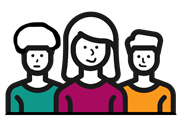 As your child becomes older and reaches adolescence they will be getting more independent. They will begin to do more things without you, start high school and be more influenced by other people.
As your child becomes older and reaches adolescence they will be getting more independent. They will begin to do more things without you, start high school and be more influenced by other people.
It might feel like your job as a parent or carer is less important, but this is a time when your support, guidance and understanding are especially important. This is the second biggest period of brain development since their babyhood. This happens at the same time as a lot of physical changes. This might not be an easy time for your child and can be challenging for parents too.
It can help to know more about how the brain changes again at this age. It can help to understand their behaviour which can sometimes be hard for you and for them to understand.
Communication
During adolescent years, communication skills continue to grow and mature.
Gross Motor Physical Development
Gross motor skills use big muscle groups. Being active and exercising muscles is important for strength.
 Older children and young people should get at least 60 minutes exercise a day. This should include activity that gets the heart beating faster. Being physically active is good for mood and emotional health too.
Older children and young people should get at least 60 minutes exercise a day. This should include activity that gets the heart beating faster. Being physically active is good for mood and emotional health too.
Some children and teens are less keen to be active as they get older. Encourage them to keep up with sports they enjoy or try new ones. If parents are active it sets a good example and helps exercise habits seem ‘normal’ in your family.
Fine Motor Physical Development
 Fine Motor Skills allow us to use the muscles in our hands. Activities where your child uses their hands tend to be good for relaxing.
Fine Motor Skills allow us to use the muscles in our hands. Activities where your child uses their hands tend to be good for relaxing.
Encourage them to carry on drawing and making stuff. Learning how to knit, sew, cook and do DIY or woodwork are good ways for young people to de-stress too.
Problem Solving Skills
Teenagers tend to act now and think later and are more likely to seek out thrills and take risks; their brain development makes them this way. The ‘thinking and working through’ part of the brain is one of the last to fully develop.
It is not always easy to get adolescents to share their thoughts and feelings with you. Trying to keep talking and communicating, give your child the opportunity to think through the actions and choices of themselves and others. This can help them in the ‘heat of the moment’.
Your child won’t always make good decisions. Knowing that they can turn to you for support when they get it wrong, as well as praise when they get it right, gives them a strong foundation as they move towards independence.
Giving them more practical responsibilities and getting them to organise themselves for their day to day life is good preparation for independence.
Have boundaries for your child. You should still know where they are, who they are with and when they will be home. Talk to your child about the reasons for rules – if you are able to agree them together, your child is more likely to stick to them. Your older child will need to have more freedom and trust - but know that they earn and keep this by their actions.
Personal & Social Development
As children get older, friends outside of the family unit begin to have more influence over them. This is normal. You still have an important role to play in helping your child make good decisions and cope with the challenges of being a young person.
 Friendship and relationship good times and upsets will be a part of their life. Listening to how they feel and not always feeling the need to ‘fix it’ will give your child the space to think things through.
Friendship and relationship good times and upsets will be a part of their life. Listening to how they feel and not always feeling the need to ‘fix it’ will give your child the space to think things through.
Firstly remember that each child will develop at their own pace.
If your child attends school or college, talk to them about your worries – they will be able to work with you to build your child’s skills and advise on any next steps needed.
You can contact the Healthy Child Programme by calling Just One Number on 0300 300 0123 or texting Parentline on 07520 631590. Our opening hours are 8am-6pm Monday-Friday (excluding bank holidays) and 9am-1pm on Saturdays.
If you are 11-19 you can text ChatHealth on 07480 635060 for confidential advice from one of our team.
To speak to other Norfolk parents and carers, you can join our online community forum below.
Also in this section...